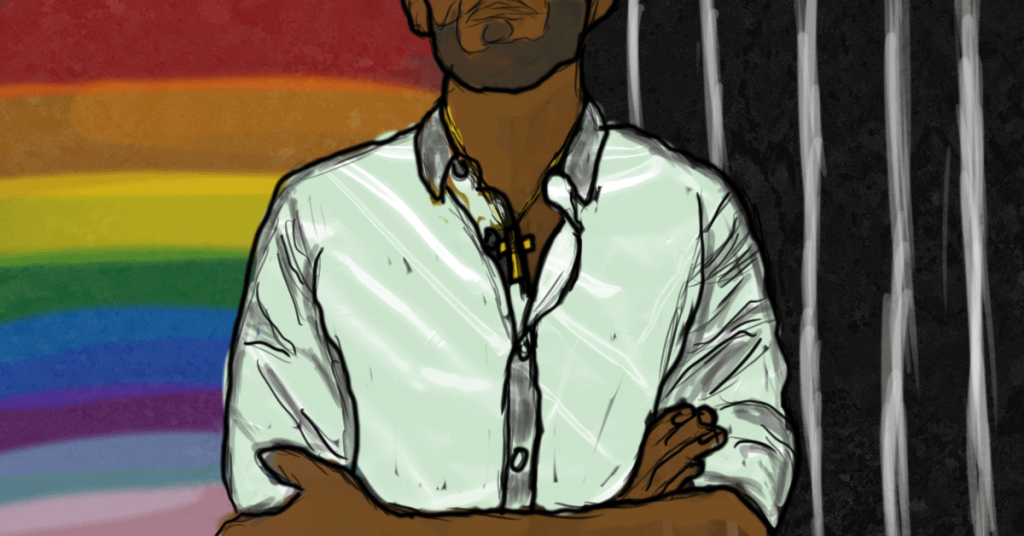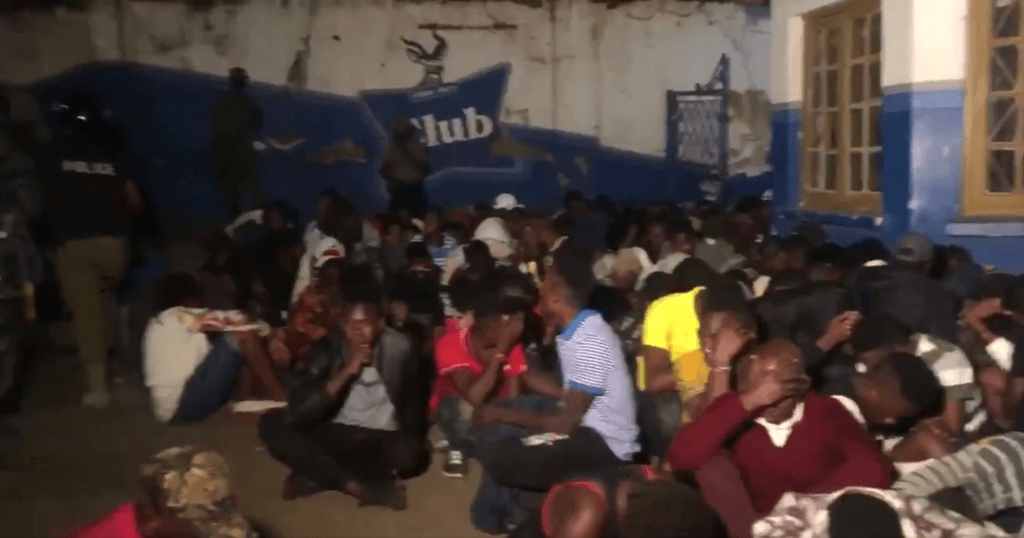I sang in the choir, frequented a gay bar and it landed me in prison
LGBTQIA persons in Africa are often compelled by society to lead dual lives.

On a Sunday night in 2016, 20-year-old Mark is dancing at Ram Bar, a gay bar in Kampala. He raises his hands and swings his hips to the music of Sheebah Karungi. Earlier in the morning, Mark was doing the same thing but using different music for a different audience and with a different motive. He was praising God unashamedly in church.
For the longest time, Mark knew who he was: A queer Christian. He had reconciled his sexuality and his faith. Whenever the conversation came up at church or within his family circles, he was a little bothered but overall unfazed. He had perfected the art of segmenting his life into two. To him, every queer person in Kampala lived that way. Mark knew when to switch his queerness on and when to switch it off.
“I feel like one day it is all going to come out into the light,” he says. “So however much I hide it, I feel like one day, I’m not gonna be able to hide it as much as I have all this time.”
The many “incidents” like his grandmother seeing an explicit picture on his phone, or one of his ex-boyfriends inadvertently outing him to his sister or even the numerous times his parents got a phone call from school about “an incident” had helped him develop both a coping mechanism and confidence that left him pretty much unscathed.
“I think one of the incidents that really scared me was a time when I got really nasty comments and tags on Facebook,” he says. “My grandma was alerted to those notifications and so were some people in my family and I had to sit down with all of them to explain myself (and) why I am getting comments from men on my photos saying I am sexy (and) I am good looking (and) they can’t wait to see me.
“How I got out of that was just trying to prove to my family that social media is social media and we cannot control who comments, who tags and what they tag you in; we really can’t. After that incident, I had to leave Facebook completely because however many countermeasures I (had) put in place there, I still could not control what was being tagged, liked, or commented on. Good enough, they had not seen anything I had commented, tagged, or liked; they had only seen what other people were doing on my timeline.”
Mark had his trusted and pretty airtight weekly schedule: Mondays, Tuesdays, and Wednesdays were mostly for college. Thursdays were choir rehearsals. On Fridays and Saturdays, he would go out with his queer friends.
For Mark, Sunday mornings and afternoons were for hours-long services, which he loved. He enjoyed serving on the worship team. There were some queer people on the team, but they were too closeted for his liking, so he kept a low profile with them. The rest of the team couldn’t care less about this flamboyant boy who always suggested costume/uniform ideas that always worked out.
Once the 4- to 5-hour services ended, “after-service” meetings would follow. He would eventually leave church at 3 a.m. or 4 p.m. to take a well-deserved nap. This nap was essential, not just to rest from the hectic church service, but for another important reason: he had to stay awake all night at a gay bar.
In Uganda, societal attitudes toward LGBTQ persons are mostly negative, and the government shares the same sentiments. Gatherings of LGBTQ persons are frowned upon and usually raided as they are considered “a promotion” of homosexuality. These sentiments have been enshrined in various laws, such as the repealed Anti-Homosexuality Act of 2014 and its successor, the Anti-Homosexuality Act of 2023.
Sunday was the perfect day for a gay bar in Kampala to operate. It was the only day they could operate in the shadows, without police interference or the possibility of other partygoers pouring rain on the gays’ parade.
Mark loved the bar. He got his first boyfriend there. He met everyone he knew (even those closeted church gays) there. There was no class or social hierarchy. “Everyone there just was gay,” he says. It was exhilarating, and he looked forward to it so much that he often cancelled all his Monday morning plans (including school and lectures) to go to the bar.
“Ram was like the only haven for all queer people,” he says. “All queer people from all these different places would meet and feel like themselves because I remember we used to come with changing clothes because you would come in your ‘straight’ outfit and then go to the washroom and change so you could feel like you are in a different part of the world. You know, a place where you’re not judged, where you belong.”
He had been going to the bar almost religiously every Sunday since high school. He knew what to expect. He’d done this a couple of hundred times. One day, what Mark didn’t know was that in just a few hours, he would be in a cold police cell and his double life would come falling onto him like a ton of bricks.

At about midnight, a swarm of policemen raided the bar. He was one of the last people to know as he sat at the far end of the bar. Most of his friends escaped by jumping over the fences into the neighbours’ compounds and quietly into the night.
“It happened so fast that I only realised it was happening when the DJ stopped the music, and there were these very dark and rude men with guns telling us to get outside to the parking lot of the bar,” Mark says. “That is when I realised that most people had jumped from behind the bar. A few of us that were left, I think we were around 40, were brought into the parking lot. These were the harshest men you would ever find; they kept on saying really homophobic words to us: ‘Oh my god! They look like girls. They act like girls. Bring them out! Bring them out!’ They kept on saying ‘chuka chini.’ (Get down in Swahili.) It was very scary, very scary. When we sat, everyone was shaking to their bones and muscles. For most of us, this was the very first time we saw homophobia and police in the same place. We didn’t know what was next for us.”
After rounding up everyone who hadn’t escaped, the police claimed they had raided the bar because they had been tipped off about the use of illegal narcotics at the premises. They checked everyone’s bag for over an hour and turned the bar upside down.
In Mark’s bag were changing clothes, a notebook and a small devotional. It was flung onto an already accumulating pile of personal effects. He would never see that bag or its contents again. After the search, the police insisted on taking everyone to the police station to make statements. Around 3 am, they asked Mark to submit his next of kin. The media had already descended on them, and by morning, their faces would have been plastered all over the news.
“The only person I was thinking of was my grandma. I didn’t want her to see me like that. At the back of our minds, we know that we have to come out to our families at some point, but not like that! ‘Not like that!’ is what I kept on telling myself,” Mark says. “I had no idea where my ‘straight’ outfit was. I was in a crop-top and very short shorts, an outfit that my parents had never even seen in my closet. I was in a place where they would never expect a person who has school the next morning to be. I was with people they had never seen me relate to. People they ridiculed. I was one of those people. All I could think about was it was over for me.”
After mulling it over, Mark thought his best bet to bail him out of his predicament was one of his church acquaintances, those closeted gays he didn’t like. Mark called him, and he was awake. But it was too late for him to process bail and come up with the money to bribe the policeman on the case. Mark spent the night in jail.
After eight hours of reconsidering every life decision, Mark was granted bail. None of his family members knew.
The following day, he went about his Monday as usual. Thankfully, his identity was not revealed to the media. He heard horror stories of people breaking their legs as they tried to jump over the walls of the bar, people who would be later detained and denied bail for months, some of whom it was their first time coming to a gay bar.
After this incident, Mark wanted to lie low but he didn’t. In a few weeks, he was in another gay bar (one had randomly sprung up to take financial advantage of the situation), and he was more confident than ever that he would be able to overcome whatever predicament the intersection of his faith and sexuality would bring him in the future.
“I was scared shitless, I was traumatised by how brutally those policemen had handled us, but I scheduled lunch to open up to this one person who had rescued me in my time of need when I least expected it,” he says. “He opened my eyes. You know you can’t live your whole life in hiding. Before I knew it, there was another bar. At first, I was very sceptical about going, but I mustered up the courage and went. This time I knew what I was going for. I used to go to Ram without knowing what I would do if something like that ever happened, but this time I went boldly.”
Mark says he’s even more queer now than ever and has a newfound appreciation for “church gays.” He says they are his lifeline and have strengthened his faith.
“I am (still) afraid of the ones that are closeted because you can never predict the next move of a closeted Christian. They will be the one person that could ruin your entire life if you cross them,” he says. “But again, they all have good reasons why they are not out of the closet, (the same) reasons I had at a certain point. So, I’m not too hard on them. I just don’t overshare with them. I know their heart and where they are coming from.”
During the challenging moments, Mark remembers that there’s another queer family (though in the shadows) awaiting him as he leads worship at church. He doesn’t think he’s living a double life, though. Life carries hundreds of facets he’s yet to explore. Faith and sexuality are just two.
This story was published in collaboration with FairPlanet as part of the Dual Life Project, which showcases how LGBTQIA persons in Africa are often compelled by society to lead dual lives.
It was published on Minority Africa and appears here with permission.




